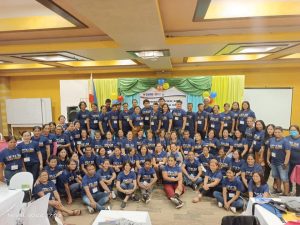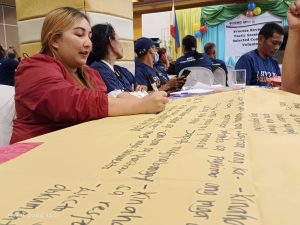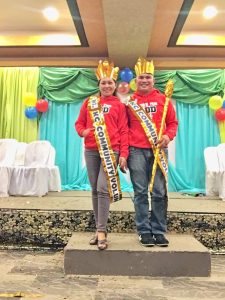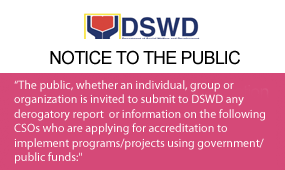
Some 84 KALAHI-CIDSS community volunteers of from all over Caraga Region recently convened in Butuan City to share their experiences and challenges during the program implementation in their respective barangays, specifically during the Community Empowerment Activity Cycle (CEAC).
KALAHI-CIDSS, which stands for Kapit-Bisig Laban sa Kahirapan Comprehensive and Integrated Delivery of Social Services, is one of the poverty alleviation programs of the national government being implemented by the Department of Social Welfare and Development (DSWD). The program uses the community-driven development (CDD) approach, a globally recognized strategy for achieving service delivery, poverty reduction, and good governance outcomes.
The 84 community volunteers attended the CEAC Review cum Tactic Session for KALAHI-CIDSS Community Volunteers at the Grand Palace Hotel in Butuan City, Friday, November 11.

The CEAC process is designed to allow marginalized communities to identify and analyze the development challenges facing them. It has five stages: (1) social preparation and community consultation; (2) community planning, proposal preparation, and approval; (3) community-managed implementation and formation of community-based organization; (4) community monitoring; (5) transition to cycle 2.
During the activity workshop, community volunteers share their experiences and challenges encountered while working with the KALAHI-CIDSS program during CEAC. These community volunteers are mobilized and play crucial roles during stages of the CEAC, all the way to project completion.
The volunteers, who were grouped by province, collated their experiences and reported it to the KALAHI-CIDSS staff and other participants.
“Sa akong kabahin, sa pagsugod gyud sa KALAHI, boluntaryo na ko daan. Ni-agi na ko nga nahimong SP chairman, BAC chairman, and procurement team chairman. Barangay captain na lang akong wala na apilan sa barangay level. Isip boluntaryo wa ko nagsapayan nga bisan mabiyaan nako akong pamilya. Oras ug panahon akong gihatag gyud sa KALAHI. (For my part, I was already a volunteer when KALAHI started. I have been an SP chairman, BAC chairman, and procurement team chairman. In the barangay level, it is only the barangay chairperson position I haven’t tried yet. As a volunteer, I rendered time to KALAHI even if I sometimes I leave my family behind),” Juancho Valer, 59, Barangay Katipunan, Loreto, Agusan del Sur shared.
Valer said that the development of their barangay for the future generation is what drives him to become a volunteer for KALAHI-CIDSS.
“Atong panglantaw isip mga bolutaryo ang kaayuhan sa atong komunidad. Kining volunteerism, naa na sa atong kasing-kasing ug dili na mawala (Our outlook as volunteers is the development of our community. Volunteerism will always be in our hearts),” Valer said.
The development objective of KALAHI-CIDSS is to have barangays/communities of targeted municipalities become empowered to achieve improved access to services and to participate in more inclusive local planning, budgeting, and implementation.
Mariana L. Mainit of Barangay Cancaban in Carmen town, Surigao del Sur, shared the challenges she experienced as a community volunteer as well as the CDD principles she learned and embraced.

“Usahay aduna pa gyuy negative labi na kung magkatapok ang [Municipal] Council. Apan akong gibuhat is ang hapsay nga pagpasabot sigun sa akong nasabtan sa proseso ug pamaagi sa KALAHI-CIDSS (Negative experiences sometimes happen especially during Council sessions. But what I did is to clearly explain to them [Council members[ about the processes of KALAHI-CIDSS),” the 58-year-old Barangay Development Council-Technical Working Group (BDC-TWG) chairperson said.
“Ako gyud ni gipaabot sa Council nga angay sundon nga mga proseso arun dunay kahapsay sa komunidad. Kining proseso sa KALAHI lahi gyud ni sa uban nga paagi. Ang KALAHI-CIDSS naglantaw ug adunay dakong tumong alang sa kalambuan sa komunidad, (I shared to the Council that we need to follow the said process to achieve harmony in the community. KALAHI-CIDSS has a unique process and its objective is for the development of the community)” she said.
“Gani sa akong kinabuhi, ang nakapalig-on isip nagsugod ko pag boluntary sa 2015 is kining three principles sa KALAHI: Participation, Transparency, ug Accountability — nga pwede gyud ma-apply sa atong pamilya. Kay kung naa ni sa atong pamilya, ang atong pamliya malinawon ug malipayon (What keeps me firm in my personal life since I volunteered in 2015 are the three principles of KALAHI: Participation, Transparency, and Accountability – which can be applied to our family. If we have these in our family, we will have peace and harmony),” she added.
On the other hand, DSWD KALAHI-CIDSS Caraga conducted the activity to review the CEAC as well as recognize and thank the volunteers for their contribution to the success of the KALAHI-CIDSS program. The volunteers were given ‘I Stand for Volunteerism’ advocacy shirts, raffle prizes, and cash prizes for the winners of the quiz bee and Mr. & Ms. Community Volunteer.


